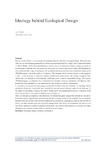Mostrar o rexistro simple do ítem
Ideology behind ecological design
| dc.contributor.author | Sarv, Lill | es_ES |
| dc.date.accessioned | 2014-10-02T12:31:50Z | |
| dc.date.available | 2014-10-02T12:31:50Z | |
| dc.date.issued | 2012 | es_ES |
| dc.identifier.citation | Culture of communication / Communication of culture, 2012: 1245-1253. ISBN: 978-84-9749-522-6 | es_ES |
| dc.identifier.isbn | 978-84-9749-522-6 | es_ES |
| dc.identifier.uri | http://hdl.handle.net/2183/13413 | |
| dc.description.abstract | [Abstract] The aim of this article is to investigate the messages that are carried by ecological design. More precisely under review are ecological products and movements which advertise their usage. One of these movements is called «Bright Green Environmentalism» and its aim is to introduce already existing solutions to environmental problems. For this scope they have quite well known web-journal called «Worldchanging» which promotes the usage of ecological and sustainable products and they have published a book called «Worldchanging: a practical guide to 21 century». The message which this movement is communicating is that it is not necessary to renounce modern comforts and consumerism while being ecological. They believe that the solution to environmental problems can be found in sustainable design. The journal «Worldchanging» is supposed to be a combination of «socially conscious capitalism» and idealism. They declare that their approach is at the same time the one of activists and the consumerists. It is possible to analyze this interesting combination of ideas from the viewpoint of ideology. Italian semiotician Ferruccio Rossi-Landi has classified the conceptions of ideology under eleven headings. In this paper we are going to analyze the case of Bright Green Environmentalism and try to discover under which one of these eleven types of ideology we could place it. Below we are going to approach the phenomena of commercial green design from semioethic viewpoint. Semioethic theory suggests that human beings should be thought of not as «res cognitas» but as «semiotic animals» because humans hold immense responsibility towards the surrounding world as they are able to reflect over their actions, plan and suspend or change them. The ability of imagination that allows us to feel for the others puts us also in a position of no alibis. The scope of semioethics is to unmask the hidden ideologies that surround us and which we ourselves help to create. | es_ES |
| dc.language.iso | eng | es_ES |
| dc.publisher | Universidade da Coruña | es_ES |
| dc.title | Ideology behind ecological design | es_ES |
| dc.type | conference output | es_ES |
| dc.rights.accessRights | open access | es_ES |
| UDC.coleccion | Publicacións UDC | es_ES |






